Evidence-Informed Nursing Practice: Dementia Care, University
VerifiedAdded on 2022/11/14
|10
|2090
|99
Report
AI Summary
This report examines evidence-informed nursing practice, specifically focusing on dementia care. It emphasizes the importance of incorporating the nursing process to provide effective patient care, including the use of clinical guidelines based on evidence-based practice and expert opinions when evidence is lacking. The report highlights the significance of evidence-based practice in gathering patient information, promoting safety, respect, and privacy, and aligning with the Australian Charter of Healthcare Rights. It underscores the need for nurses to focus on patients' mental health, decision-making, and memory retention. Furthermore, the report discusses ethical considerations like autonomy, beneficence, non-maleficence, and justice in dementia care. It also provides suggestions for healthcare facilities to incorporate evidence-based nursing practice, including symptom assessment, care planning, medication management, routine patient observation, and the implementation of holistic care policies. The report concludes by emphasizing the importance of patient-centered care and ethical considerations in providing optimal care for patients with dementia.
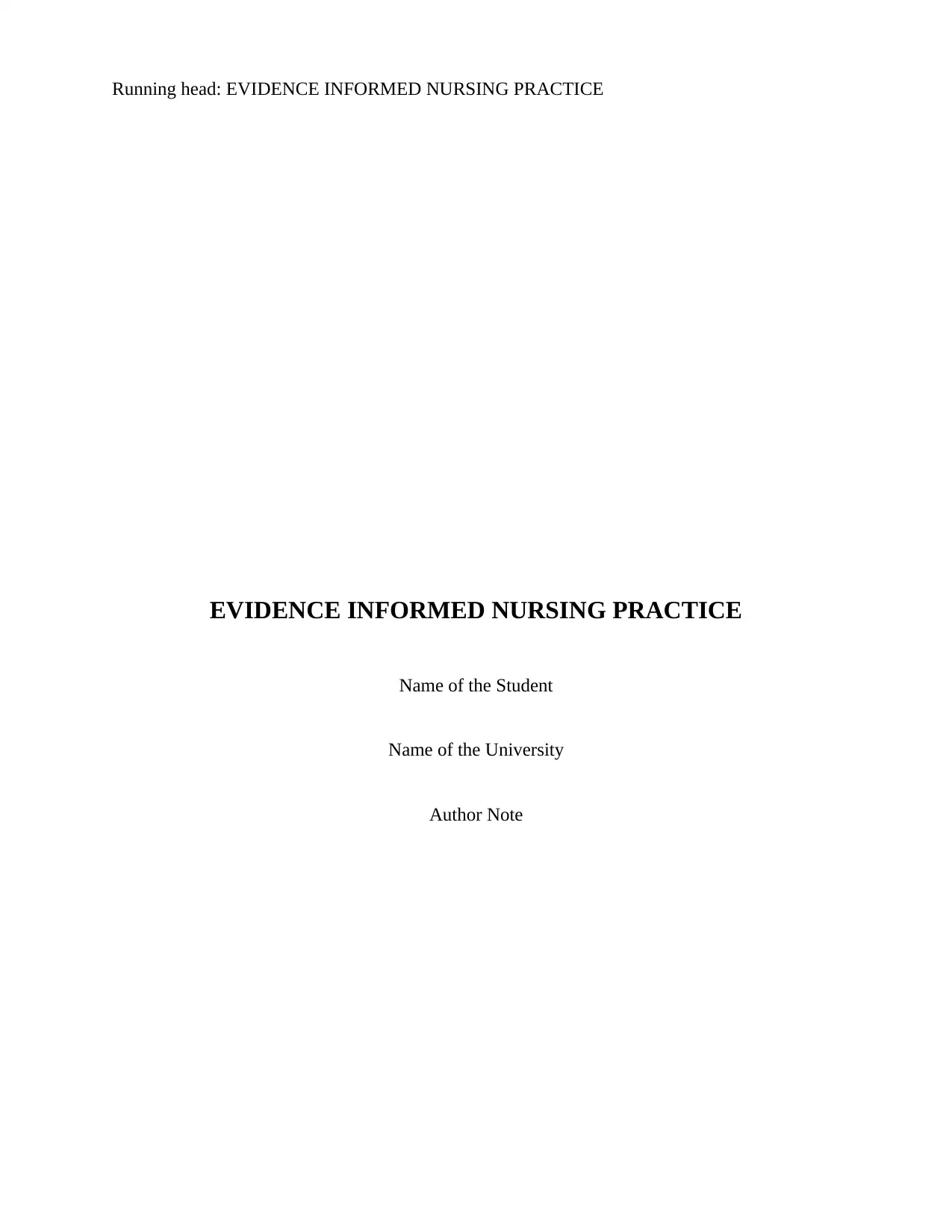
Running head: EVIDENCE INFORMED NURSING PRACTICE
EVIDENCE INFORMED NURSING PRACTICE
Name of the Student
Name of the University
Author Note
EVIDENCE INFORMED NURSING PRACTICE
Name of the Student
Name of the University
Author Note
Paraphrase This Document
Need a fresh take? Get an instant paraphrase of this document with our AI Paraphraser
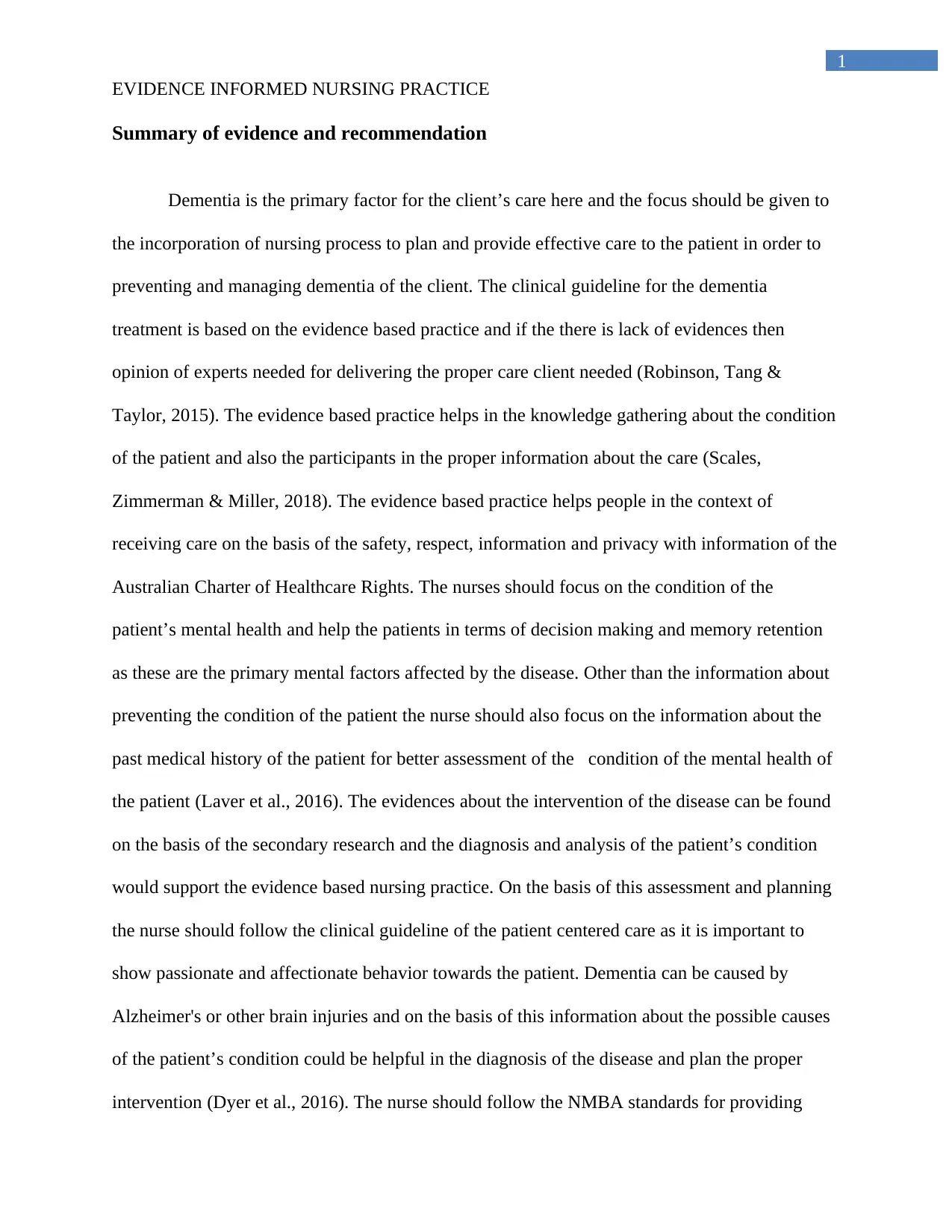
1
EVIDENCE INFORMED NURSING PRACTICE
Summary of evidence and recommendation
Dementia is the primary factor for the client’s care here and the focus should be given to
the incorporation of nursing process to plan and provide effective care to the patient in order to
preventing and managing dementia of the client. The clinical guideline for the dementia
treatment is based on the evidence based practice and if the there is lack of evidences then
opinion of experts needed for delivering the proper care client needed (Robinson, Tang &
Taylor, 2015). The evidence based practice helps in the knowledge gathering about the condition
of the patient and also the participants in the proper information about the care (Scales,
Zimmerman & Miller, 2018). The evidence based practice helps people in the context of
receiving care on the basis of the safety, respect, information and privacy with information of the
Australian Charter of Healthcare Rights. The nurses should focus on the condition of the
patient’s mental health and help the patients in terms of decision making and memory retention
as these are the primary mental factors affected by the disease. Other than the information about
preventing the condition of the patient the nurse should also focus on the information about the
past medical history of the patient for better assessment of the condition of the mental health of
the patient (Laver et al., 2016). The evidences about the intervention of the disease can be found
on the basis of the secondary research and the diagnosis and analysis of the patient’s condition
would support the evidence based nursing practice. On the basis of this assessment and planning
the nurse should follow the clinical guideline of the patient centered care as it is important to
show passionate and affectionate behavior towards the patient. Dementia can be caused by
Alzheimer's or other brain injuries and on the basis of this information about the possible causes
of the patient’s condition could be helpful in the diagnosis of the disease and plan the proper
intervention (Dyer et al., 2016). The nurse should follow the NMBA standards for providing
EVIDENCE INFORMED NURSING PRACTICE
Summary of evidence and recommendation
Dementia is the primary factor for the client’s care here and the focus should be given to
the incorporation of nursing process to plan and provide effective care to the patient in order to
preventing and managing dementia of the client. The clinical guideline for the dementia
treatment is based on the evidence based practice and if the there is lack of evidences then
opinion of experts needed for delivering the proper care client needed (Robinson, Tang &
Taylor, 2015). The evidence based practice helps in the knowledge gathering about the condition
of the patient and also the participants in the proper information about the care (Scales,
Zimmerman & Miller, 2018). The evidence based practice helps people in the context of
receiving care on the basis of the safety, respect, information and privacy with information of the
Australian Charter of Healthcare Rights. The nurses should focus on the condition of the
patient’s mental health and help the patients in terms of decision making and memory retention
as these are the primary mental factors affected by the disease. Other than the information about
preventing the condition of the patient the nurse should also focus on the information about the
past medical history of the patient for better assessment of the condition of the mental health of
the patient (Laver et al., 2016). The evidences about the intervention of the disease can be found
on the basis of the secondary research and the diagnosis and analysis of the patient’s condition
would support the evidence based nursing practice. On the basis of this assessment and planning
the nurse should follow the clinical guideline of the patient centered care as it is important to
show passionate and affectionate behavior towards the patient. Dementia can be caused by
Alzheimer's or other brain injuries and on the basis of this information about the possible causes
of the patient’s condition could be helpful in the diagnosis of the disease and plan the proper
intervention (Dyer et al., 2016). The nurse should follow the NMBA standards for providing
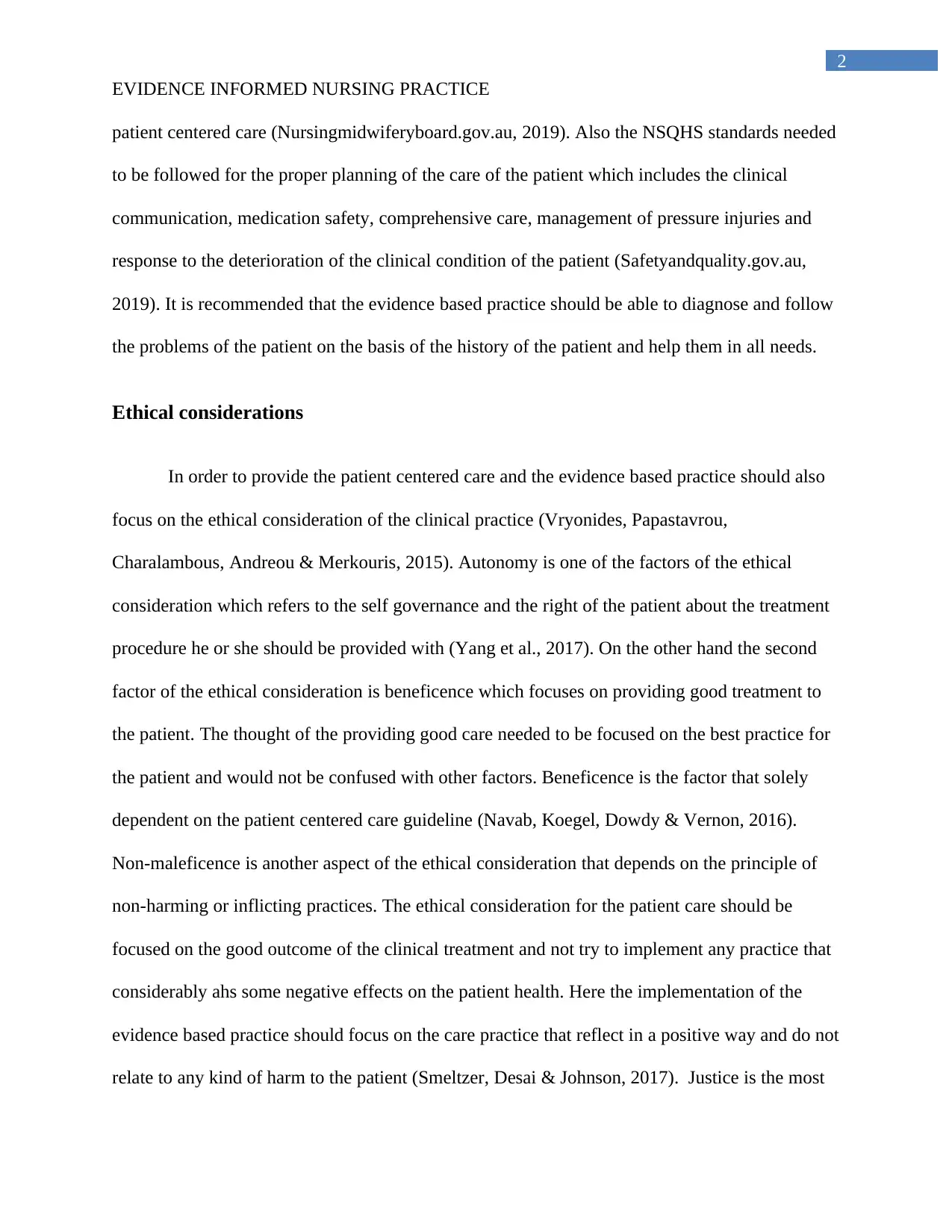
2
EVIDENCE INFORMED NURSING PRACTICE
patient centered care (Nursingmidwiferyboard.gov.au, 2019). Also the NSQHS standards needed
to be followed for the proper planning of the care of the patient which includes the clinical
communication, medication safety, comprehensive care, management of pressure injuries and
response to the deterioration of the clinical condition of the patient (Safetyandquality.gov.au,
2019). It is recommended that the evidence based practice should be able to diagnose and follow
the problems of the patient on the basis of the history of the patient and help them in all needs.
Ethical considerations
In order to provide the patient centered care and the evidence based practice should also
focus on the ethical consideration of the clinical practice (Vryonides, Papastavrou,
Charalambous, Andreou & Merkouris, 2015). Autonomy is one of the factors of the ethical
consideration which refers to the self governance and the right of the patient about the treatment
procedure he or she should be provided with (Yang et al., 2017). On the other hand the second
factor of the ethical consideration is beneficence which focuses on providing good treatment to
the patient. The thought of the providing good care needed to be focused on the best practice for
the patient and would not be confused with other factors. Beneficence is the factor that solely
dependent on the patient centered care guideline (Navab, Koegel, Dowdy & Vernon, 2016).
Non-maleficence is another aspect of the ethical consideration that depends on the principle of
non-harming or inflicting practices. The ethical consideration for the patient care should be
focused on the good outcome of the clinical treatment and not try to implement any practice that
considerably ahs some negative effects on the patient health. Here the implementation of the
evidence based practice should focus on the care practice that reflect in a positive way and do not
relate to any kind of harm to the patient (Smeltzer, Desai & Johnson, 2017). Justice is the most
EVIDENCE INFORMED NURSING PRACTICE
patient centered care (Nursingmidwiferyboard.gov.au, 2019). Also the NSQHS standards needed
to be followed for the proper planning of the care of the patient which includes the clinical
communication, medication safety, comprehensive care, management of pressure injuries and
response to the deterioration of the clinical condition of the patient (Safetyandquality.gov.au,
2019). It is recommended that the evidence based practice should be able to diagnose and follow
the problems of the patient on the basis of the history of the patient and help them in all needs.
Ethical considerations
In order to provide the patient centered care and the evidence based practice should also
focus on the ethical consideration of the clinical practice (Vryonides, Papastavrou,
Charalambous, Andreou & Merkouris, 2015). Autonomy is one of the factors of the ethical
consideration which refers to the self governance and the right of the patient about the treatment
procedure he or she should be provided with (Yang et al., 2017). On the other hand the second
factor of the ethical consideration is beneficence which focuses on providing good treatment to
the patient. The thought of the providing good care needed to be focused on the best practice for
the patient and would not be confused with other factors. Beneficence is the factor that solely
dependent on the patient centered care guideline (Navab, Koegel, Dowdy & Vernon, 2016).
Non-maleficence is another aspect of the ethical consideration that depends on the principle of
non-harming or inflicting practices. The ethical consideration for the patient care should be
focused on the good outcome of the clinical treatment and not try to implement any practice that
considerably ahs some negative effects on the patient health. Here the implementation of the
evidence based practice should focus on the care practice that reflect in a positive way and do not
relate to any kind of harm to the patient (Smeltzer, Desai & Johnson, 2017). Justice is the most
⊘ This is a preview!⊘
Do you want full access?
Subscribe today to unlock all pages.

Trusted by 1+ million students worldwide
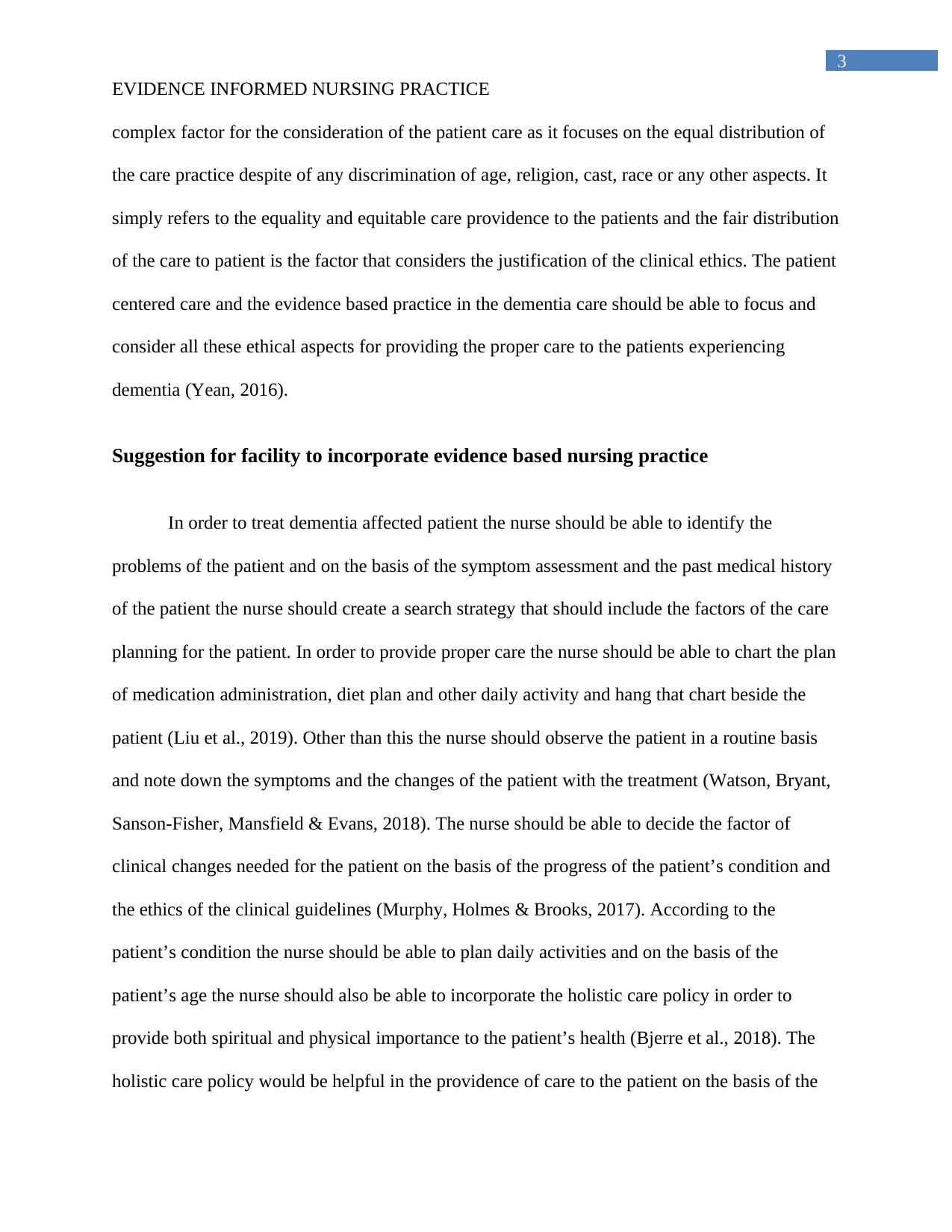
3
EVIDENCE INFORMED NURSING PRACTICE
complex factor for the consideration of the patient care as it focuses on the equal distribution of
the care practice despite of any discrimination of age, religion, cast, race or any other aspects. It
simply refers to the equality and equitable care providence to the patients and the fair distribution
of the care to patient is the factor that considers the justification of the clinical ethics. The patient
centered care and the evidence based practice in the dementia care should be able to focus and
consider all these ethical aspects for providing the proper care to the patients experiencing
dementia (Yean, 2016).
Suggestion for facility to incorporate evidence based nursing practice
In order to treat dementia affected patient the nurse should be able to identify the
problems of the patient and on the basis of the symptom assessment and the past medical history
of the patient the nurse should create a search strategy that should include the factors of the care
planning for the patient. In order to provide proper care the nurse should be able to chart the plan
of medication administration, diet plan and other daily activity and hang that chart beside the
patient (Liu et al., 2019). Other than this the nurse should observe the patient in a routine basis
and note down the symptoms and the changes of the patient with the treatment (Watson, Bryant,
Sanson-Fisher, Mansfield & Evans, 2018). The nurse should be able to decide the factor of
clinical changes needed for the patient on the basis of the progress of the patient’s condition and
the ethics of the clinical guidelines (Murphy, Holmes & Brooks, 2017). According to the
patient’s condition the nurse should be able to plan daily activities and on the basis of the
patient’s age the nurse should also be able to incorporate the holistic care policy in order to
provide both spiritual and physical importance to the patient’s health (Bjerre et al., 2018). The
holistic care policy would be helpful in the providence of care to the patient on the basis of the
EVIDENCE INFORMED NURSING PRACTICE
complex factor for the consideration of the patient care as it focuses on the equal distribution of
the care practice despite of any discrimination of age, religion, cast, race or any other aspects. It
simply refers to the equality and equitable care providence to the patients and the fair distribution
of the care to patient is the factor that considers the justification of the clinical ethics. The patient
centered care and the evidence based practice in the dementia care should be able to focus and
consider all these ethical aspects for providing the proper care to the patients experiencing
dementia (Yean, 2016).
Suggestion for facility to incorporate evidence based nursing practice
In order to treat dementia affected patient the nurse should be able to identify the
problems of the patient and on the basis of the symptom assessment and the past medical history
of the patient the nurse should create a search strategy that should include the factors of the care
planning for the patient. In order to provide proper care the nurse should be able to chart the plan
of medication administration, diet plan and other daily activity and hang that chart beside the
patient (Liu et al., 2019). Other than this the nurse should observe the patient in a routine basis
and note down the symptoms and the changes of the patient with the treatment (Watson, Bryant,
Sanson-Fisher, Mansfield & Evans, 2018). The nurse should be able to decide the factor of
clinical changes needed for the patient on the basis of the progress of the patient’s condition and
the ethics of the clinical guidelines (Murphy, Holmes & Brooks, 2017). According to the
patient’s condition the nurse should be able to plan daily activities and on the basis of the
patient’s age the nurse should also be able to incorporate the holistic care policy in order to
provide both spiritual and physical importance to the patient’s health (Bjerre et al., 2018). The
holistic care policy would be helpful in the providence of care to the patient on the basis of the
Paraphrase This Document
Need a fresh take? Get an instant paraphrase of this document with our AI Paraphraser
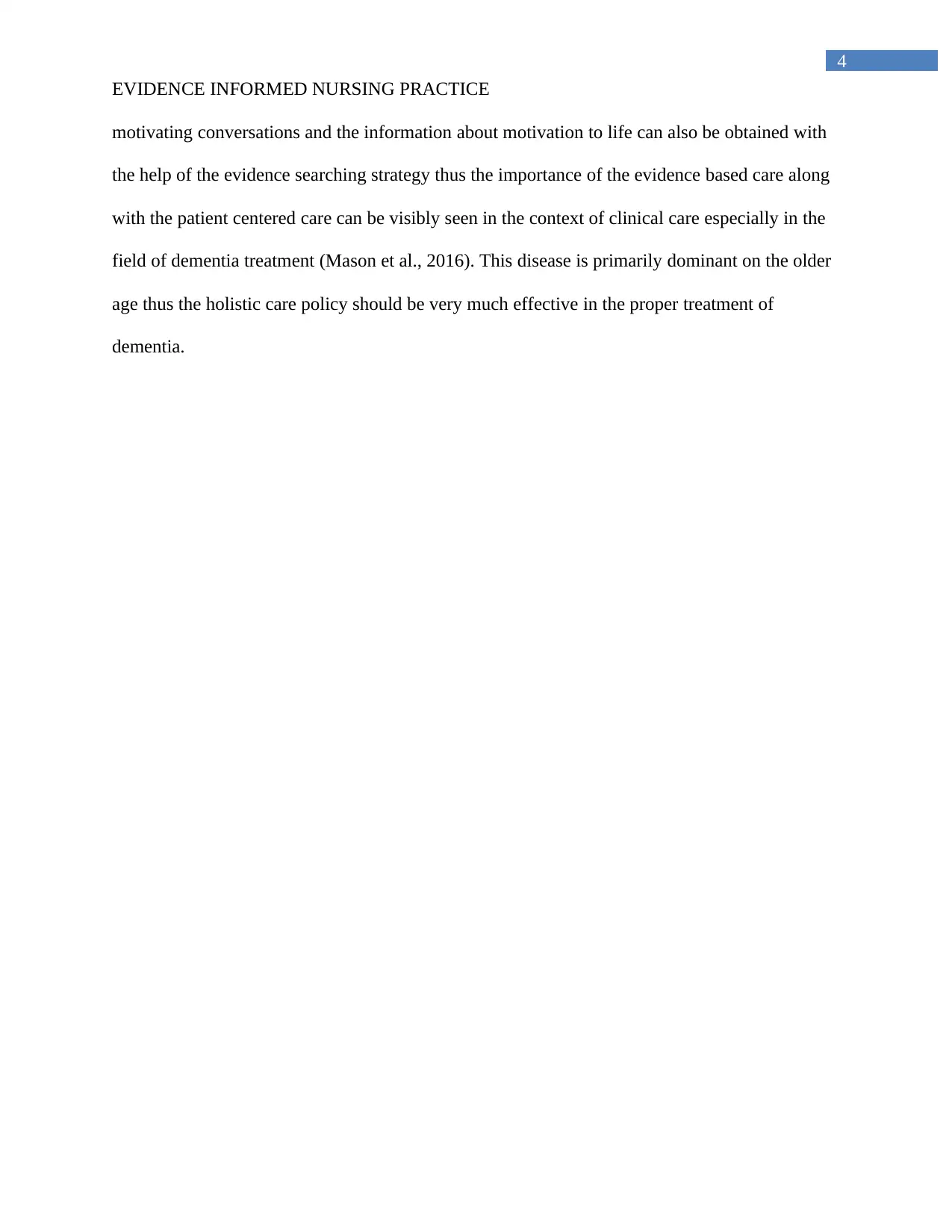
4
EVIDENCE INFORMED NURSING PRACTICE
motivating conversations and the information about motivation to life can also be obtained with
the help of the evidence searching strategy thus the importance of the evidence based care along
with the patient centered care can be visibly seen in the context of clinical care especially in the
field of dementia treatment (Mason et al., 2016). This disease is primarily dominant on the older
age thus the holistic care policy should be very much effective in the proper treatment of
dementia.
EVIDENCE INFORMED NURSING PRACTICE
motivating conversations and the information about motivation to life can also be obtained with
the help of the evidence searching strategy thus the importance of the evidence based care along
with the patient centered care can be visibly seen in the context of clinical care especially in the
field of dementia treatment (Mason et al., 2016). This disease is primarily dominant on the older
age thus the holistic care policy should be very much effective in the proper treatment of
dementia.
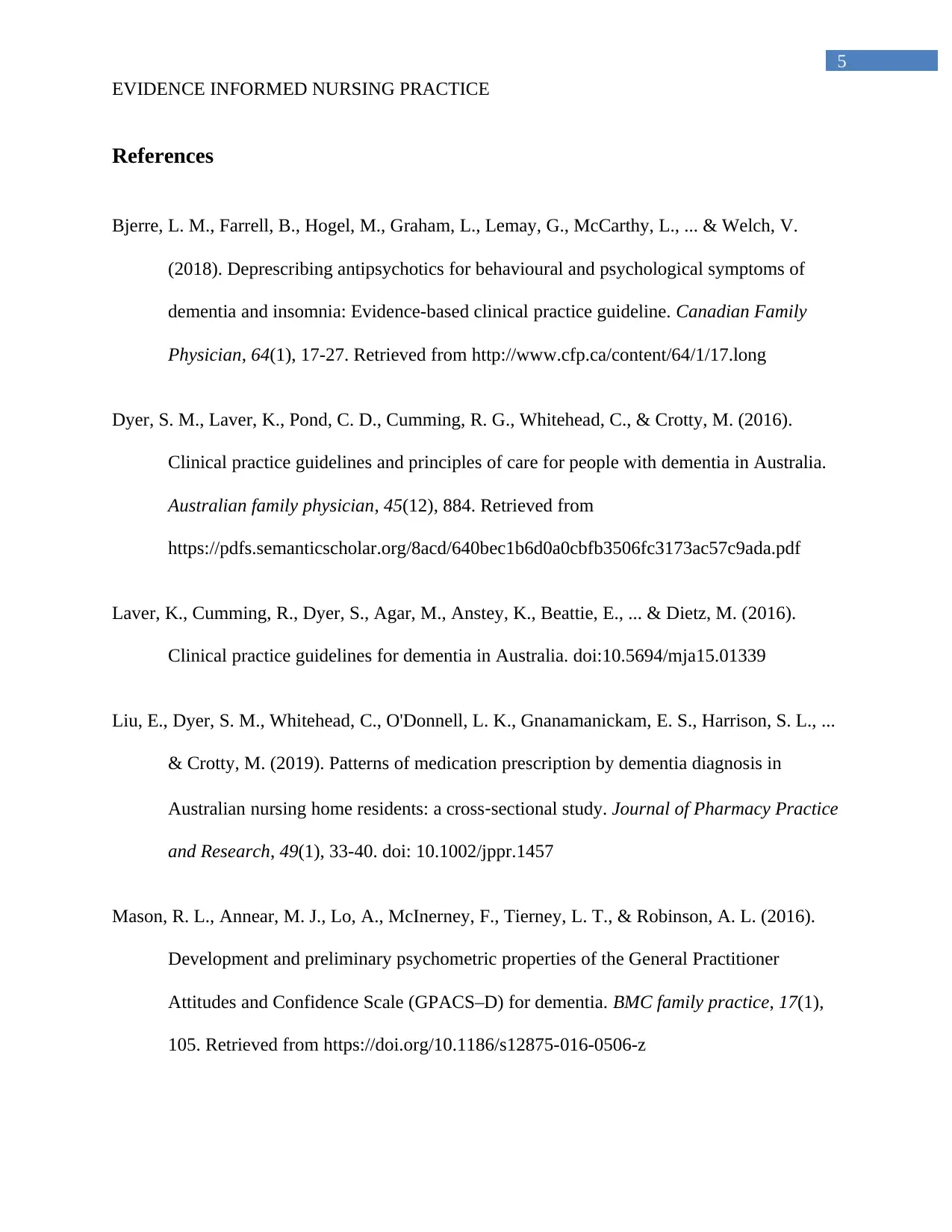
5
EVIDENCE INFORMED NURSING PRACTICE
References
Bjerre, L. M., Farrell, B., Hogel, M., Graham, L., Lemay, G., McCarthy, L., ... & Welch, V.
(2018). Deprescribing antipsychotics for behavioural and psychological symptoms of
dementia and insomnia: Evidence-based clinical practice guideline. Canadian Family
Physician, 64(1), 17-27. Retrieved from http://www.cfp.ca/content/64/1/17.long
Dyer, S. M., Laver, K., Pond, C. D., Cumming, R. G., Whitehead, C., & Crotty, M. (2016).
Clinical practice guidelines and principles of care for people with dementia in Australia.
Australian family physician, 45(12), 884. Retrieved from
https://pdfs.semanticscholar.org/8acd/640bec1b6d0a0cbfb3506fc3173ac57c9ada.pdf
Laver, K., Cumming, R., Dyer, S., Agar, M., Anstey, K., Beattie, E., ... & Dietz, M. (2016).
Clinical practice guidelines for dementia in Australia. doi:10.5694/mja15.01339
Liu, E., Dyer, S. M., Whitehead, C., O'Donnell, L. K., Gnanamanickam, E. S., Harrison, S. L., ...
& Crotty, M. (2019). Patterns of medication prescription by dementia diagnosis in
Australian nursing home residents: a cross‐sectional study. Journal of Pharmacy Practice
and Research, 49(1), 33-40. doi: 10.1002/jppr.1457
Mason, R. L., Annear, M. J., Lo, A., McInerney, F., Tierney, L. T., & Robinson, A. L. (2016).
Development and preliminary psychometric properties of the General Practitioner
Attitudes and Confidence Scale (GPACS–D) for dementia. BMC family practice, 17(1),
105. Retrieved from https://doi.org/10.1186/s12875-016-0506-z
EVIDENCE INFORMED NURSING PRACTICE
References
Bjerre, L. M., Farrell, B., Hogel, M., Graham, L., Lemay, G., McCarthy, L., ... & Welch, V.
(2018). Deprescribing antipsychotics for behavioural and psychological symptoms of
dementia and insomnia: Evidence-based clinical practice guideline. Canadian Family
Physician, 64(1), 17-27. Retrieved from http://www.cfp.ca/content/64/1/17.long
Dyer, S. M., Laver, K., Pond, C. D., Cumming, R. G., Whitehead, C., & Crotty, M. (2016).
Clinical practice guidelines and principles of care for people with dementia in Australia.
Australian family physician, 45(12), 884. Retrieved from
https://pdfs.semanticscholar.org/8acd/640bec1b6d0a0cbfb3506fc3173ac57c9ada.pdf
Laver, K., Cumming, R., Dyer, S., Agar, M., Anstey, K., Beattie, E., ... & Dietz, M. (2016).
Clinical practice guidelines for dementia in Australia. doi:10.5694/mja15.01339
Liu, E., Dyer, S. M., Whitehead, C., O'Donnell, L. K., Gnanamanickam, E. S., Harrison, S. L., ...
& Crotty, M. (2019). Patterns of medication prescription by dementia diagnosis in
Australian nursing home residents: a cross‐sectional study. Journal of Pharmacy Practice
and Research, 49(1), 33-40. doi: 10.1002/jppr.1457
Mason, R. L., Annear, M. J., Lo, A., McInerney, F., Tierney, L. T., & Robinson, A. L. (2016).
Development and preliminary psychometric properties of the General Practitioner
Attitudes and Confidence Scale (GPACS–D) for dementia. BMC family practice, 17(1),
105. Retrieved from https://doi.org/10.1186/s12875-016-0506-z
⊘ This is a preview!⊘
Do you want full access?
Subscribe today to unlock all pages.

Trusted by 1+ million students worldwide
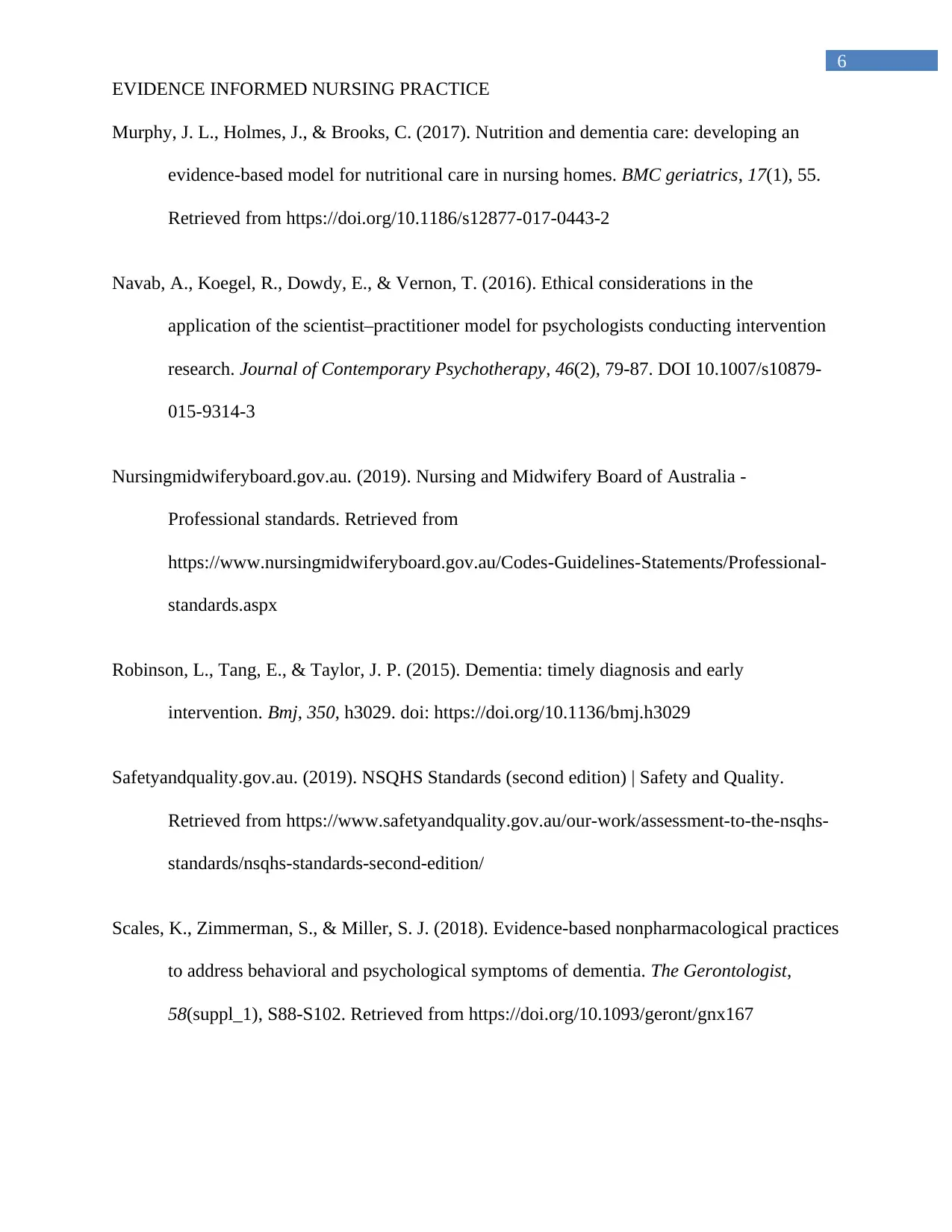
6
EVIDENCE INFORMED NURSING PRACTICE
Murphy, J. L., Holmes, J., & Brooks, C. (2017). Nutrition and dementia care: developing an
evidence-based model for nutritional care in nursing homes. BMC geriatrics, 17(1), 55.
Retrieved from https://doi.org/10.1186/s12877-017-0443-2
Navab, A., Koegel, R., Dowdy, E., & Vernon, T. (2016). Ethical considerations in the
application of the scientist–practitioner model for psychologists conducting intervention
research. Journal of Contemporary Psychotherapy, 46(2), 79-87. DOI 10.1007/s10879-
015-9314-3
Nursingmidwiferyboard.gov.au. (2019). Nursing and Midwifery Board of Australia -
Professional standards. Retrieved from
https://www.nursingmidwiferyboard.gov.au/Codes-Guidelines-Statements/Professional-
standards.aspx
Robinson, L., Tang, E., & Taylor, J. P. (2015). Dementia: timely diagnosis and early
intervention. Bmj, 350, h3029. doi: https://doi.org/10.1136/bmj.h3029
Safetyandquality.gov.au. (2019). NSQHS Standards (second edition) | Safety and Quality.
Retrieved from https://www.safetyandquality.gov.au/our-work/assessment-to-the-nsqhs-
standards/nsqhs-standards-second-edition/
Scales, K., Zimmerman, S., & Miller, S. J. (2018). Evidence-based nonpharmacological practices
to address behavioral and psychological symptoms of dementia. The Gerontologist,
58(suppl_1), S88-S102. Retrieved from https://doi.org/10.1093/geront/gnx167
EVIDENCE INFORMED NURSING PRACTICE
Murphy, J. L., Holmes, J., & Brooks, C. (2017). Nutrition and dementia care: developing an
evidence-based model for nutritional care in nursing homes. BMC geriatrics, 17(1), 55.
Retrieved from https://doi.org/10.1186/s12877-017-0443-2
Navab, A., Koegel, R., Dowdy, E., & Vernon, T. (2016). Ethical considerations in the
application of the scientist–practitioner model for psychologists conducting intervention
research. Journal of Contemporary Psychotherapy, 46(2), 79-87. DOI 10.1007/s10879-
015-9314-3
Nursingmidwiferyboard.gov.au. (2019). Nursing and Midwifery Board of Australia -
Professional standards. Retrieved from
https://www.nursingmidwiferyboard.gov.au/Codes-Guidelines-Statements/Professional-
standards.aspx
Robinson, L., Tang, E., & Taylor, J. P. (2015). Dementia: timely diagnosis and early
intervention. Bmj, 350, h3029. doi: https://doi.org/10.1136/bmj.h3029
Safetyandquality.gov.au. (2019). NSQHS Standards (second edition) | Safety and Quality.
Retrieved from https://www.safetyandquality.gov.au/our-work/assessment-to-the-nsqhs-
standards/nsqhs-standards-second-edition/
Scales, K., Zimmerman, S., & Miller, S. J. (2018). Evidence-based nonpharmacological practices
to address behavioral and psychological symptoms of dementia. The Gerontologist,
58(suppl_1), S88-S102. Retrieved from https://doi.org/10.1093/geront/gnx167
Paraphrase This Document
Need a fresh take? Get an instant paraphrase of this document with our AI Paraphraser
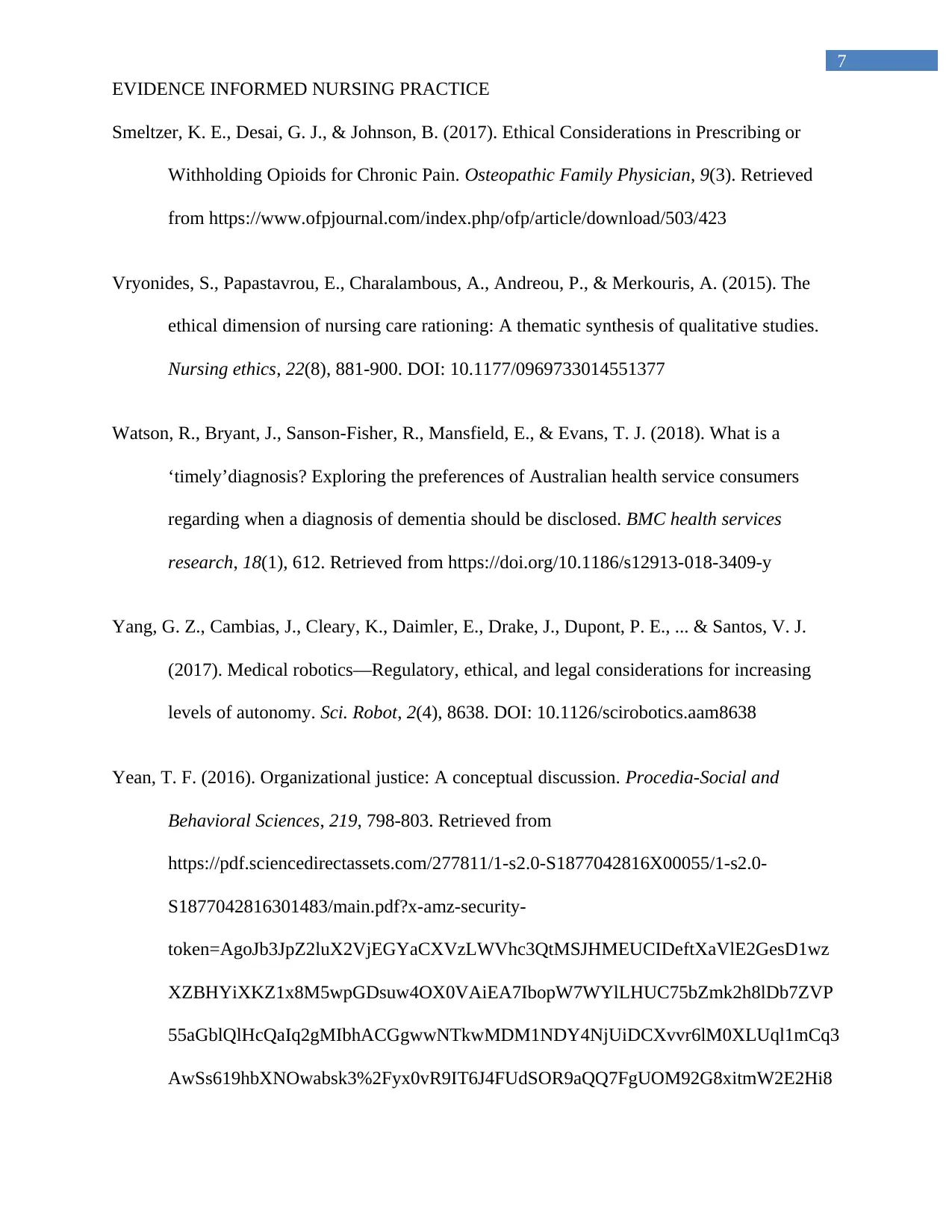
7
EVIDENCE INFORMED NURSING PRACTICE
Smeltzer, K. E., Desai, G. J., & Johnson, B. (2017). Ethical Considerations in Prescribing or
Withholding Opioids for Chronic Pain. Osteopathic Family Physician, 9(3). Retrieved
from https://www.ofpjournal.com/index.php/ofp/article/download/503/423
Vryonides, S., Papastavrou, E., Charalambous, A., Andreou, P., & Merkouris, A. (2015). The
ethical dimension of nursing care rationing: A thematic synthesis of qualitative studies.
Nursing ethics, 22(8), 881-900. DOI: 10.1177/0969733014551377
Watson, R., Bryant, J., Sanson-Fisher, R., Mansfield, E., & Evans, T. J. (2018). What is a
‘timely’diagnosis? Exploring the preferences of Australian health service consumers
regarding when a diagnosis of dementia should be disclosed. BMC health services
research, 18(1), 612. Retrieved from https://doi.org/10.1186/s12913-018-3409-y
Yang, G. Z., Cambias, J., Cleary, K., Daimler, E., Drake, J., Dupont, P. E., ... & Santos, V. J.
(2017). Medical robotics—Regulatory, ethical, and legal considerations for increasing
levels of autonomy. Sci. Robot, 2(4), 8638. DOI: 10.1126/scirobotics.aam8638
Yean, T. F. (2016). Organizational justice: A conceptual discussion. Procedia-Social and
Behavioral Sciences, 219, 798-803. Retrieved from
https://pdf.sciencedirectassets.com/277811/1-s2.0-S1877042816X00055/1-s2.0-
S1877042816301483/main.pdf?x-amz-security-
token=AgoJb3JpZ2luX2VjEGYaCXVzLWVhc3QtMSJHMEUCIDeftXaVlE2GesD1wz
XZBHYiXKZ1x8M5wpGDsuw4OX0VAiEA7IbopW7WYlLHUC75bZmk2h8lDb7ZVP
55aGblQlHcQaIq2gMIbhACGgwwNTkwMDM1NDY4NjUiDCXvvr6lM0XLUql1mCq3
AwSs619hbXNOwabsk3%2Fyx0vR9IT6J4FUdSOR9aQQ7FgUOM92G8xitmW2E2Hi8
EVIDENCE INFORMED NURSING PRACTICE
Smeltzer, K. E., Desai, G. J., & Johnson, B. (2017). Ethical Considerations in Prescribing or
Withholding Opioids for Chronic Pain. Osteopathic Family Physician, 9(3). Retrieved
from https://www.ofpjournal.com/index.php/ofp/article/download/503/423
Vryonides, S., Papastavrou, E., Charalambous, A., Andreou, P., & Merkouris, A. (2015). The
ethical dimension of nursing care rationing: A thematic synthesis of qualitative studies.
Nursing ethics, 22(8), 881-900. DOI: 10.1177/0969733014551377
Watson, R., Bryant, J., Sanson-Fisher, R., Mansfield, E., & Evans, T. J. (2018). What is a
‘timely’diagnosis? Exploring the preferences of Australian health service consumers
regarding when a diagnosis of dementia should be disclosed. BMC health services
research, 18(1), 612. Retrieved from https://doi.org/10.1186/s12913-018-3409-y
Yang, G. Z., Cambias, J., Cleary, K., Daimler, E., Drake, J., Dupont, P. E., ... & Santos, V. J.
(2017). Medical robotics—Regulatory, ethical, and legal considerations for increasing
levels of autonomy. Sci. Robot, 2(4), 8638. DOI: 10.1126/scirobotics.aam8638
Yean, T. F. (2016). Organizational justice: A conceptual discussion. Procedia-Social and
Behavioral Sciences, 219, 798-803. Retrieved from
https://pdf.sciencedirectassets.com/277811/1-s2.0-S1877042816X00055/1-s2.0-
S1877042816301483/main.pdf?x-amz-security-
token=AgoJb3JpZ2luX2VjEGYaCXVzLWVhc3QtMSJHMEUCIDeftXaVlE2GesD1wz
XZBHYiXKZ1x8M5wpGDsuw4OX0VAiEA7IbopW7WYlLHUC75bZmk2h8lDb7ZVP
55aGblQlHcQaIq2gMIbhACGgwwNTkwMDM1NDY4NjUiDCXvvr6lM0XLUql1mCq3
AwSs619hbXNOwabsk3%2Fyx0vR9IT6J4FUdSOR9aQQ7FgUOM92G8xitmW2E2Hi8
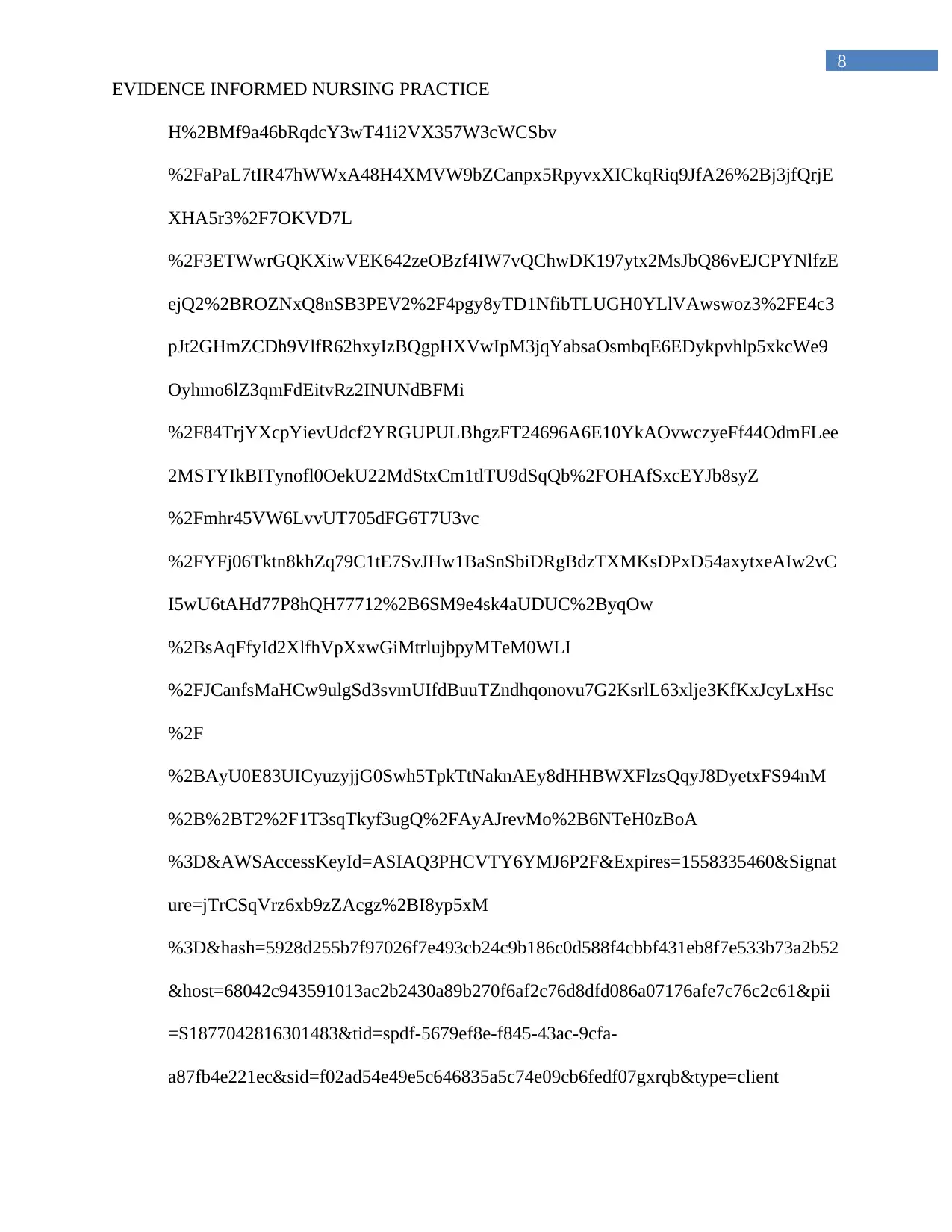
8
EVIDENCE INFORMED NURSING PRACTICE
H%2BMf9a46bRqdcY3wT41i2VX357W3cWCSbv
%2FaPaL7tIR47hWWxA48H4XMVW9bZCanpx5RpyvxXICkqRiq9JfA26%2Bj3jfQrjE
XHA5r3%2F7OKVD7L
%2F3ETWwrGQKXiwVEK642zeOBzf4IW7vQChwDK197ytx2MsJbQ86vEJCPYNlfzE
ejQ2%2BROZNxQ8nSB3PEV2%2F4pgy8yTD1NfibTLUGH0YLlVAwswoz3%2FE4c3
pJt2GHmZCDh9VlfR62hxyIzBQgpHXVwIpM3jqYabsaOsmbqE6EDykpvhlp5xkcWe9
Oyhmo6lZ3qmFdEitvRz2INUNdBFMi
%2F84TrjYXcpYievUdcf2YRGUPULBhgzFT24696A6E10YkAOvwczyeFf44OdmFLee
2MSTYIkBITynofl0OekU22MdStxCm1tlTU9dSqQb%2FOHAfSxcEYJb8syZ
%2Fmhr45VW6LvvUT705dFG6T7U3vc
%2FYFj06Tktn8khZq79C1tE7SvJHw1BaSnSbiDRgBdzTXMKsDPxD54axytxeAIw2vC
I5wU6tAHd77P8hQH77712%2B6SM9e4sk4aUDUC%2ByqOw
%2BsAqFfyId2XlfhVpXxwGiMtrlujbpyMTeM0WLI
%2FJCanfsMaHCw9ulgSd3svmUIfdBuuTZndhqonovu7G2KsrlL63xlje3KfKxJcyLxHsc
%2F
%2BAyU0E83UICyuzyjjG0Swh5TpkTtNaknAEy8dHHBWXFlzsQqyJ8DyetxFS94nM
%2B%2BT2%2F1T3sqTkyf3ugQ%2FAyAJrevMo%2B6NTeH0zBoA
%3D&AWSAccessKeyId=ASIAQ3PHCVTY6YMJ6P2F&Expires=1558335460&Signat
ure=jTrCSqVrz6xb9zZAcgz%2BI8yp5xM
%3D&hash=5928d255b7f97026f7e493cb24c9b186c0d588f4cbbf431eb8f7e533b73a2b52
&host=68042c943591013ac2b2430a89b270f6af2c76d8dfd086a07176afe7c76c2c61&pii
=S1877042816301483&tid=spdf-5679ef8e-f845-43ac-9cfa-
a87fb4e221ec&sid=f02ad54e49e5c646835a5c74e09cb6fedf07gxrqb&type=client
EVIDENCE INFORMED NURSING PRACTICE
H%2BMf9a46bRqdcY3wT41i2VX357W3cWCSbv
%2FaPaL7tIR47hWWxA48H4XMVW9bZCanpx5RpyvxXICkqRiq9JfA26%2Bj3jfQrjE
XHA5r3%2F7OKVD7L
%2F3ETWwrGQKXiwVEK642zeOBzf4IW7vQChwDK197ytx2MsJbQ86vEJCPYNlfzE
ejQ2%2BROZNxQ8nSB3PEV2%2F4pgy8yTD1NfibTLUGH0YLlVAwswoz3%2FE4c3
pJt2GHmZCDh9VlfR62hxyIzBQgpHXVwIpM3jqYabsaOsmbqE6EDykpvhlp5xkcWe9
Oyhmo6lZ3qmFdEitvRz2INUNdBFMi
%2F84TrjYXcpYievUdcf2YRGUPULBhgzFT24696A6E10YkAOvwczyeFf44OdmFLee
2MSTYIkBITynofl0OekU22MdStxCm1tlTU9dSqQb%2FOHAfSxcEYJb8syZ
%2Fmhr45VW6LvvUT705dFG6T7U3vc
%2FYFj06Tktn8khZq79C1tE7SvJHw1BaSnSbiDRgBdzTXMKsDPxD54axytxeAIw2vC
I5wU6tAHd77P8hQH77712%2B6SM9e4sk4aUDUC%2ByqOw
%2BsAqFfyId2XlfhVpXxwGiMtrlujbpyMTeM0WLI
%2FJCanfsMaHCw9ulgSd3svmUIfdBuuTZndhqonovu7G2KsrlL63xlje3KfKxJcyLxHsc
%2F
%2BAyU0E83UICyuzyjjG0Swh5TpkTtNaknAEy8dHHBWXFlzsQqyJ8DyetxFS94nM
%2B%2BT2%2F1T3sqTkyf3ugQ%2FAyAJrevMo%2B6NTeH0zBoA
%3D&AWSAccessKeyId=ASIAQ3PHCVTY6YMJ6P2F&Expires=1558335460&Signat
ure=jTrCSqVrz6xb9zZAcgz%2BI8yp5xM
%3D&hash=5928d255b7f97026f7e493cb24c9b186c0d588f4cbbf431eb8f7e533b73a2b52
&host=68042c943591013ac2b2430a89b270f6af2c76d8dfd086a07176afe7c76c2c61&pii
=S1877042816301483&tid=spdf-5679ef8e-f845-43ac-9cfa-
a87fb4e221ec&sid=f02ad54e49e5c646835a5c74e09cb6fedf07gxrqb&type=client
⊘ This is a preview!⊘
Do you want full access?
Subscribe today to unlock all pages.

Trusted by 1+ million students worldwide

9
EVIDENCE INFORMED NURSING PRACTICE
EVIDENCE INFORMED NURSING PRACTICE
1 out of 10
Related Documents
Your All-in-One AI-Powered Toolkit for Academic Success.
+13062052269
info@desklib.com
Available 24*7 on WhatsApp / Email
![[object Object]](/_next/static/media/star-bottom.7253800d.svg)
Unlock your academic potential
Copyright © 2020–2026 A2Z Services. All Rights Reserved. Developed and managed by ZUCOL.





